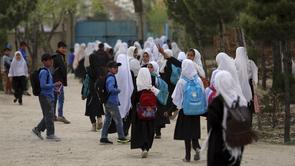 Afghan students leave school classes in a primary school in Kabul, Afghanistan on March 27, 2021. (RAHMAT GUL / FILE / AP)
Afghan students leave school classes in a primary school in Kabul, Afghanistan on March 27, 2021. (RAHMAT GUL / FILE / AP)
UNITED NATIONS - The UN Security Council on Tuesday expressed deep concern about the increasing erosion of respect for the human rights and fundamental freedoms of women and girls in Afghanistan by the Taliban.
The members of the UN Security Council expressed deep concern regarding the announcements by the Taliban that all women must cover their faces in public spaces and in media broadcasts, only leave home in cases of necessity, and that violations of this directive will lead to the punishment of their male relatives
Restrictions that limit access to education, employment, freedom of movement, and women's full, equal and meaningful participation in public life contradict the expectations of the international community and the commitments made by the Taliban to the Afghan people, said the Security Council in a press statement.
The council members expressed deep concern regarding the announcements by the Taliban that all women must cover their faces in public spaces and in media broadcasts, only leave home in cases of necessity, and that violations of this directive will lead to the punishment of their male relatives. They also expressed concern regarding the decision by the Taliban to dissolve several key national institutions, said the statement.
ALSO READ: UN chief: Afghan girls school suspension 'deeply damaging'
The council members called on the Taliban to swiftly reverse the policies and practices that are currently restricting the human rights and fundamental freedoms of Afghan women and girls. They reiterated their call on the Taliban to adhere to their commitments to reopen schools for all female students without further delay.
They further expressed deep concern regarding the volatile situation in Afghanistan, including political, economic, social and security challenges and their impact on the lives of the Afghan people, in particular, continued terrorist attacks targeting civilians and civilian infrastructure, and the cultivation, production, trade and trafficking of illicit drugs.
The council members also expressed deep concern about the dire humanitarian and economic situation in Afghanistan and recognized the need for strengthened efforts to provide humanitarian assistance and other activities that support basic human needs in Afghanistan. They emphasized that the effective delivery of humanitarian assistance requires all actors to allow full, safe and unhindered humanitarian access for all humanitarian personnel, including women.
READ MORE: Afghanistan's first female UN envoy warns over women's rights
They further recognized the need to help address the substantial challenges facing Afghanistan's economy, including through efforts to restore the banking and financial systems and efforts to enable the use of assets belonging to Afghanistan's Central Bank for the benefit of the Afghan people.


